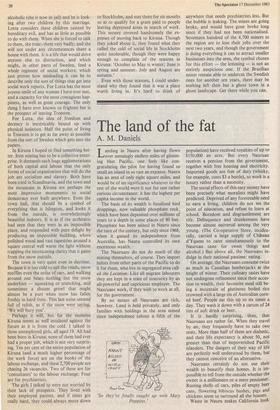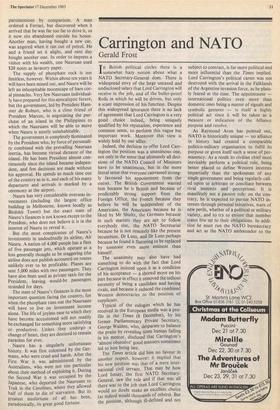The land of the fat
A. M. Daniels
Landing in Nauru after having flown over seemingly endless miles of glisten- ing blue Pacific, one feels like con- gratulating the pilot for having found so small an island in so vast an expanse. Nauru has an area of only eight square miles, and would be of no significance whatever to the rest of the world were it not for one rather curious circumstance: it has the highest per capita income in the world.
The basis of its wealth is fossilised bird droppings, now valuable phosphate rock, which have been deposited over millions of years to a depth in some places of 80 feet. Phosphate has been mined in Nauru since the turn of the century, but only since 1968, when it gained its independence from Australia, has Nauru controlled its own enormous wealth.
The Nauruans do not do much of the mining themselves, of course. They import helots from other parts of the Pacific to do it for them, who live in segregated area call- ed the Location. Like all migrant labourers they are kept in a state of insecurity by an all-powerful and capricious employer. The Nauruans work, if they wish to work at all, for the government.
By no means all Nauruans are rich, however. Land is held privately, and only families with holdings in the area mined since independence (about a fifth of the
'So they've finally caught up with Mary Poppins.'
population) have received royalties of up to $150,000 an acre. But every Nauruan receives a pension from the government, together with free housing and electricity. Imported goods are free of duty (whisky, for example, costs $3 a bottle), so work is a luxury rather than a necessity.
The social effects of this easy money have been precisely what moralists might have predicted. Deprived of any foreseeable need to earn a living, children do not see the point of education, and refuse to learn at school. Boredom and disgruntlement are rife. Delinquency and drunkenness have become almost universal among the very young. (The Co-operative Store, inciden- tally, carried a large supply of Château d'Yquem to cater simultaneously to the Nauruan taste for sweet things and alcohol.) But above all, the Nauruans in- dulge in their national pastime: eating.
On average, the Nauruans consume twice as much as Canadian lumberjacks at the height of winter. Their culinary tastes have not undergone refinement since their acces- sion to wealth, their favourite meal still be- ing a mountain of glutinous boiled rice crowned with a large tin of Australian corn- ed beef. People eat this up to six times a day. They wash it down with a carton of 24 tins of soft drink or beer.
It is hardly surprising, then, that Nauruans are rather fat. When they travel by air, they frequently have to take two seats. More than half of them are diabetic, and their life expectancy is about 50, not greater than that of impoverished Pacific islanders. The dangers of their way of life are perfectly well understood by them, but they cannot conceive of an alternative.
Nauruans certainly do not use their wealth to beautify their homes. It is im- possible to tell from the outside whether the owner is a millionaire or a mere pensioner. Rusting shells of cars, piles of empty beer cans, flowering hibiscus bushes, pigs and chickens seem to surround all the houses.
Waste in Nauru makes California look parsimonious by comparison. A man ordered a Ferrari, but discovered when it arrived that he was far too fat to drive it, so it now sits abandoned outside his house. Another man, having bought a new car, was angered when it ran out of petrol. He and a friend set it alight, and next day bought another one. In order to impress a visitor with his wealth, one Nauruan used $20 notes as lavatory paper.
The supply of phosphate rock is not limitless, however. Within about ten years it will have been mined out, and Nauru will be left an inhospitable moonscape of bare cor- al pinnacles. Very few Nauruans individual- ly have prepared for this apocalyptic future, but the government, led by President Ham- mer de Roburt, who is a close friend of President Marcos, is negotiating the pur- chase of an island in the Philippines to which the Nauruans will be able to move when Nauru is utterly uninhabitable.
The government is completely tiominated by the President who, by force of personali- ty combined with the prevailing Nauruan inertia, has become virtual dictator of the island. He has been President almost con- tinuously since the island became indepen- dent, and few decisions are made without his approval. He spends as much time out of the country as in it, and each of his many departures and arrivals is marked by a ceremony at the airport.
Nauru has very considerable overseas in- vestments (including the largest office building in Melbourne, known locally as Birdshit Tower) but the exact state of Nauru's finances is not known except to the President, who does not believe it is in the interest of Nauru to reveal it.
But the most conspicuous of Nauru's investments in undoubtedly its airline, Air Nauru. A nation of 4,000 people has a fleet of five passenger jets, which operate at a loss generally thought to be staggering (the airline does not publish accounts) on routes unlikely ever to be profitable. Planes are sent 5,000 miles with two passengers. They have also been used as private taxis for the President, leaving would-be passengers stranded for days. The state of Nauru's finances is the most important question facing the country, for when the phosphate runs out the Nauruans will have to live on investment income alone. The life of joyless ease to which they have become accustomed will not readily be exchanged for something more satisfying or productive. Unless they undergo a change of heart, they are destined to remain parasites for ever. Nauru has a singularly unfortunate history. It was first colonised by the Ger- mans, who were cruel and harsh. After the First War it was administered by the Australians, who were not too particular about their method of exploiting it. During the Second War it was occupied by the Japanese, who deported the Nauruans to Truk in the Carolines, where they allowed half of them to die of starvation. But its greatest misfortune of all has been, paradoxically, its great good fortune.







































































 Previous page
Previous page